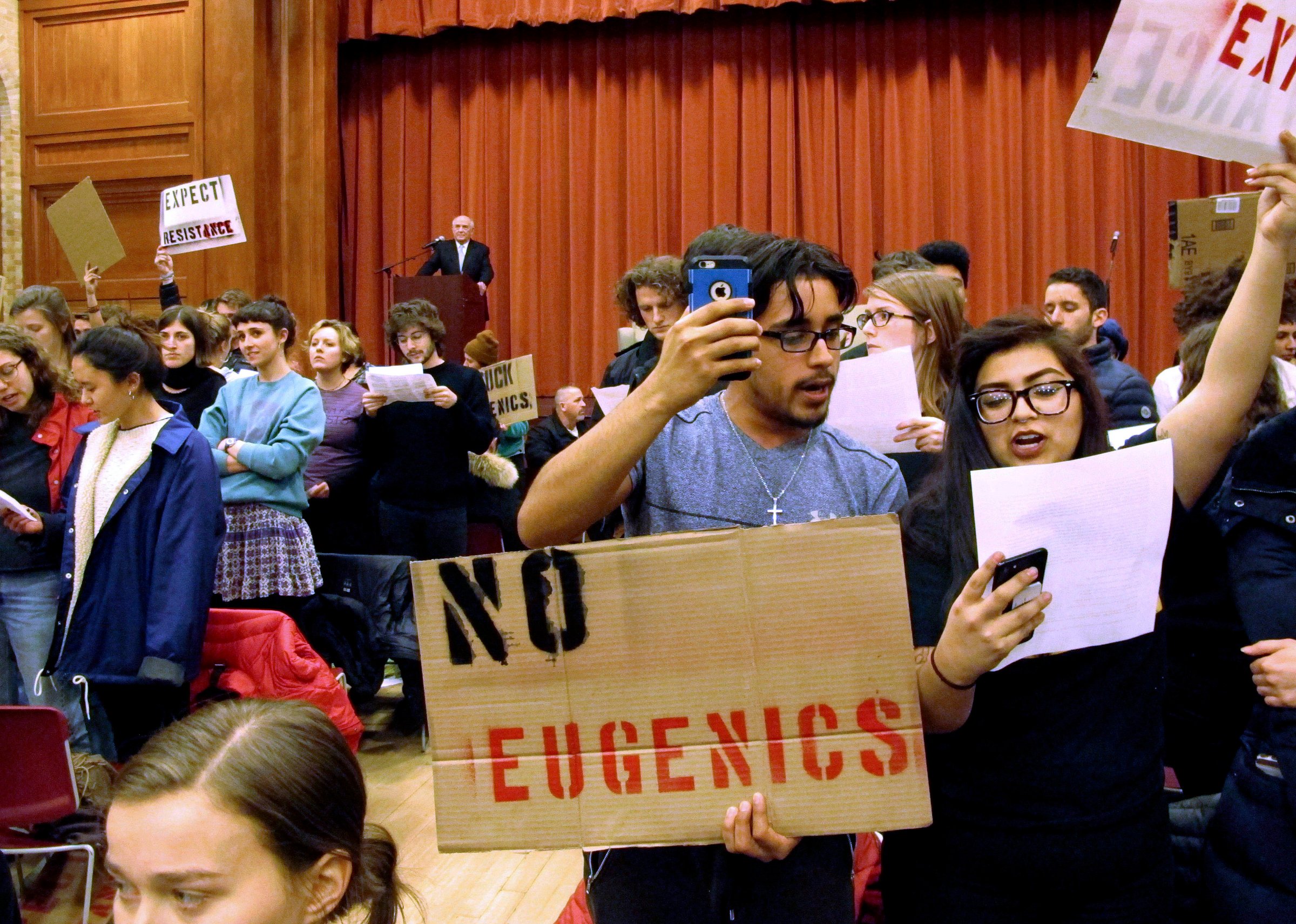
Recent student demonstrations that escalated into violence have fueled a national debate over free speech on college campuses, forcing universities to rethink how to effectively prepare for controversial speakers — and the accompanying protests.
Conservative writer Charles Murray, who has faced criticism for a 1994 book that linked intelligence level with race, was shouted down and then physically confronted by protesters at Vermont’s Middlebury College on March 2. A month earlier, an event featuring controversial right-wing pundit Milo Yiannopoulos at the University of California, Berkeley was canceled after peaceful protests turned violent. And at New York University, 11 people were arrested at a protest over a speech by conservative comedian Gavin McInnes.
“I think any campus administration that might have said, after it happened at Berkeley, ‘That could never happen here,’ I think was probably having second thoughts after seeing what happened at Middlebury,” said Berkeley spokesperson Dan Mogulof.
The next school to grapple with this issue could be Vanderbilt University, where Murray is scheduled to speak on Tuesday in his first campus event since Middlebury.
“We’re aware of the Middlebury event, and with that in mind, we’re looking at what might or might not happen on our own campus,” said Vanderbilt spokesperson Elizabeth Latt. She said Murray’s event at Vanderbilt, which is not sponsored by the university, is an invitation-only address organized by the Vanderbilt chapter of the Adam Smith Society, an association for MBA students.
“As with a number of events on campus, Vanderbilt has made an assessment; however, in the interest of safety and security, we do not share information about contingency planning,” Latt said in an email.
Ahead of Yiannopoulos’ event at Berkeley last month, Mogulof said the school took standard steps to prepare, meeting with student organizers to discuss basic security measures and to make sure they were aware of other recent campus protests over Yiannopoulos. Because of the attention and pushback the Berkeley event attracted in the weeks preceding the speech, the school also brought in specially trained campus police officers from other schools in the University of California system.
But on the day of the event, protests grew destructive, and Yiannopoulos’ speech was canceled. The university has blamed the violence on “agitators who invaded the campus and disrupted” an otherwise peaceful student protest.
In the future, Mogulof said, it will be important to carefully consider details like the venue and timing of a given event. And he said the university has an obligation to be better prepared. “You can only have something unprecedented happen once because the next time, it’s precedented,” he said. “We won’t have any ability to say we didn’t see it coming next time.”
Anticipating protests of Murray’s lecture, Middlebury administrators had arranged for two officers from the town police department to be on campus, in addition to private security personnel to help with crowd control. The school prepared a separate room for Murray to finish his speech via livestream if necessary, and administrators required a Middlebury ID badge to enter the building for the lecture in an effort to limit attendance to students and faculty.
But the protest escalated anyway. Middlebury President Laurie Patton called it an “extremely difficult episode” and launched an investigation to determine what happened and who was involved.
“I think every institution, every college or university in the country, right now needs to step back and consider the extent to which we’re in a different political environment,” said Middlebury spokesperson Bill Burger. “Whether it’s at U.C. Berkeley or Middlebury, we need to recognize the internal and external forces that come into play and plan accordingly.”
Leaders at both schools have said they will continue to support free speech and protest, while working to prevent violent responses to future speakers.
“What hasn’t changed at all is our complete commitment to the First Amendment and free speech and not standing in the way when student groups want to invite speakers,” Mogulof said.
Will Creeley, senior vice president of legal and public advocacy at the Foundation for Individual Rights in Education (FIRE), said he has spoken with many university leaders who are preparing for their school to be next. “There’s a kind of heightened probability of further reaction,” Creeley said.
FIRE, a free-speech watchdog group, advocates for the rights of students and faculty members — both those who protest and those who invite controversial speakers to campus. Creeley said universities should enforce consequences for violence and encourage students to demonstrate their disagreement by asking pointed questions, ignoring speakers altogether or protesting peacefully in a separate location.
“The old adage about an ounce of prevention being worth a pound of cure is really applicable here,” he said.
More Must-Reads from TIME
- Cybersecurity Experts Are Sounding the Alarm on DOGE
- Meet the 2025 Women of the Year
- The Harsh Truth About Disability Inclusion
- Why Do More Young Adults Have Cancer?
- Colman Domingo Leads With Radical Love
- How to Get Better at Doing Things Alone
- Michelle Zauner Stares Down the Darkness
Write to Katie Reilly at Katie.Reilly@time.com